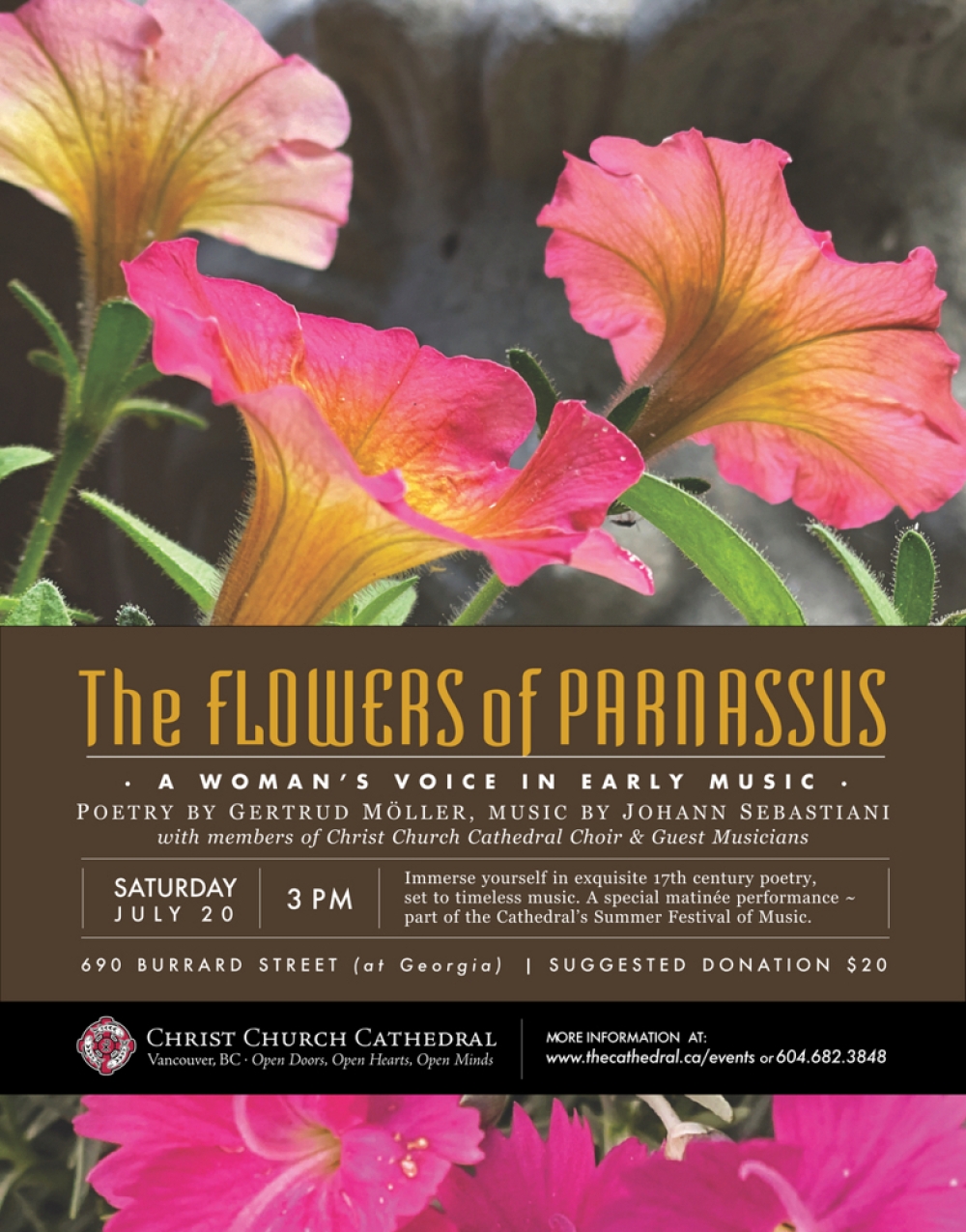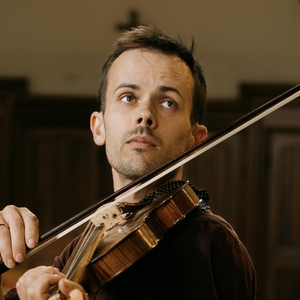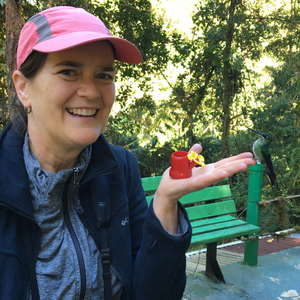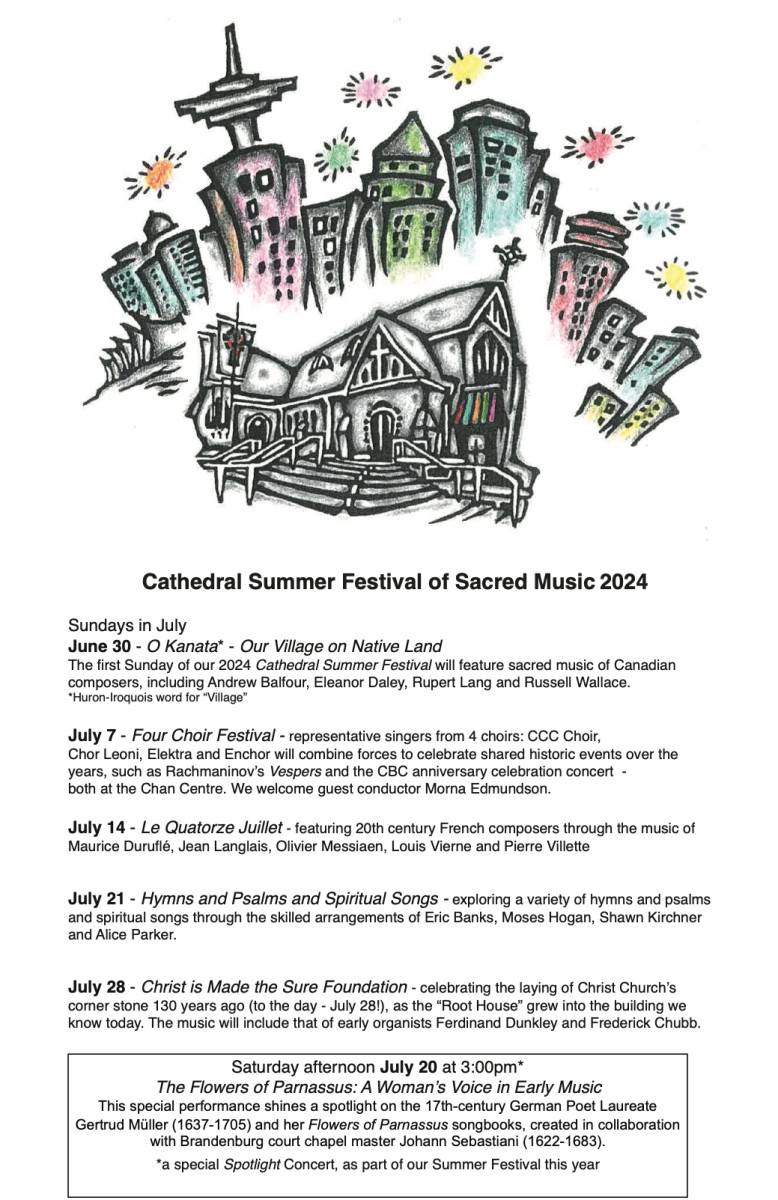

The Flowers of Parnassus:A Woman’s Voice in Early Music |
||
|
|
||
|
|
|
|
|
|
||
|
|
|
|
| Cathedral Summer Festival of Sacred Music 2024 | ||
Follow Us:
NOTES
BY PATRICIA MILEWSKI
The Flowers of Parnassus: A Woman’s Voice in Early Music
“O place of beauty, in your honour, this golden tune doth sound so sweet and lovely.”
The lyrics of the songs featured today were written by the 17th century German poet, Gertrud Möller (1637–1705), set to music by Johann Sebastiani (1622–1683), the court chapel master of Königsberg (now Kaliningrad, Russia). They are found in the ‘Flowers of Parnassus’ songbooks (1672, 1675) that Möller co-published with Sebastiani, a remarkable example of male-female collaboration at that time. The songbooks represent a female poet’s voice, which the music elegantly amplifies.
Educated at home in a Lutheran family, Möller showed a talent for writing poetry early on. She was the wife of Dr. Med. Peter Möller, and the mother of 10 children. A celebrated poet in Königsberg, she competed in the highly competitive, male-dominated literary market, resulting in a legacy of works published in her own name. Her fame extended south from the German Baltic provinces to Nuremburg, where she was accepted in the Pegnitz Flower Society, appointed poet laureate, and granted the pseudonym Mornille.
Records show that the ‘Flower of Parnassus’ songbooks were marketed at the book fairs in Frankfurt and Leipzig under Sebastiani’s name. This obscured Möller’s authorship for centuries in music scholarship. Many of Möller’s lyrics of faith were ‘anonymized’ and taken up into other songbooks, where they were assigned to familiar hymn tunes instead of Sebastiani’s more complicated accompaniments. Her songs about love, beauty, and virtue demonstrate a deep understanding of human character. Some of the songs you will hear today are likely being heard for the first time in almost 400 years.
Song List
Flowers of Parnassus: A Woman’s Voice in Early Music
Lyrics by Gertrud Möller (1637–1705) set to music by Johann Sebastiani (1622–1683)
from volumes I and II of Parnaß-Blumen oder Geist- und Weltliche Lieder, 1672 and 1675.
FAITH
Ich hab auf jenem Jammerthal
Gott lob / die hoch gewünschte Zeit
O Hertzens-Angst!
Jesu / Jesu / du mein Licht
Herr Jesu / Dreyerley
LOVE, BEAUTY & VIRTUE
Dir / schöner Ort / zu Ehren
Der Witwen Klag
Was geht es Zoile dich an
Schäfer-Gespräch
Dieser Tag sol lustig seyn
Viermahl zehl ich anders recht
Der müde Tag geht nun zur Ruh
Performers
Creative Team
Byron Scott Hanson
Patricia Milewski
Bruce Hoffman
Meet the Performers
Byron Hanson
 Byron is a lead singer and occasional artistic music director with the Christ Church Cathedral Choir. Switching from bass, to tenor, to alto, sometimes in the same service, he identifies as “pan-sectional.” He sings second tenor and low bass in Chor Leoni, and is bass section lead with The Vancouver Jewish Folk Choir. Byron plays the cello, electric bass, accordion, lap steel guitar, melodica and toy piano. Byron loves early music, and enjoys a “traditional” approach as well as exploring looped based performances of chant and renaissance music. He is also an avid origamist, costumer, singing wine glass consultant, and works 9-5 in Finance.
Byron is a lead singer and occasional artistic music director with the Christ Church Cathedral Choir. Switching from bass, to tenor, to alto, sometimes in the same service, he identifies as “pan-sectional.” He sings second tenor and low bass in Chor Leoni, and is bass section lead with The Vancouver Jewish Folk Choir. Byron plays the cello, electric bass, accordion, lap steel guitar, melodica and toy piano. Byron loves early music, and enjoys a “traditional” approach as well as exploring looped based performances of chant and renaissance music. He is also an avid origamist, costumer, singing wine glass consultant, and works 9-5 in Finance.
Matthew Anketell
 Born in the UK, Matthew discovered a passion for singing during high school, debuting as the Major General in "The Pirates of Penzance." At Pembroke College, Cambridge, where he studied chemistry, Matthew honed his vocal prowess under the guidance of renowned conductor Anna Lapwood. Relocating to Vancouver three years ago, he was delighted to be able to continue his choral journey with Rupert Lang and the Christ Church Cathedral Choir. Alongside singing and pursuing chemistry research at SFU, Matthew is an avid hiker and cyclist and loves exploring this beautiful part of the world.
Born in the UK, Matthew discovered a passion for singing during high school, debuting as the Major General in "The Pirates of Penzance." At Pembroke College, Cambridge, where he studied chemistry, Matthew honed his vocal prowess under the guidance of renowned conductor Anna Lapwood. Relocating to Vancouver three years ago, he was delighted to be able to continue his choral journey with Rupert Lang and the Christ Church Cathedral Choir. Alongside singing and pursuing chemistry research at SFU, Matthew is an avid hiker and cyclist and loves exploring this beautiful part of the world.
Jiten Beairsto
 Jiten Beairsto completed his Master of Music at UBC in 2017, and shortly afterward co-founded the Gallo Chamber Players, a group of instrumentalists specializing in Baroque repertoire. During the pandemic, his career shifted towards psychology, and in 2023, he became a registered clinical counsellor as well as a father. Given these life-changing developments, he is grateful to continue performing with a variety of ensembles across B.C., both as a modern and baroque violinist. These include the Vancouver, Vancouver Island, and Kamloops Symphonies, as well as the Pacific Baroque Orchestra and Victoria Baroque.
Jiten Beairsto completed his Master of Music at UBC in 2017, and shortly afterward co-founded the Gallo Chamber Players, a group of instrumentalists specializing in Baroque repertoire. During the pandemic, his career shifted towards psychology, and in 2023, he became a registered clinical counsellor as well as a father. Given these life-changing developments, he is grateful to continue performing with a variety of ensembles across B.C., both as a modern and baroque violinist. These include the Vancouver, Vancouver Island, and Kamloops Symphonies, as well as the Pacific Baroque Orchestra and Victoria Baroque.
Kilian Benson
 Kilian Benson is an avid singer, lending his voice to choral communities in and around Vancouver. He joined Christ Church Cathedral Choir in 2016 and is currently a member of Vancouver Chamber Choir. In 2018, he received a diploma in classical voice from Capilano University and in 2024, a BFA in music and sound from Simon Fraser University. When he is not singing, Kilian works as an audio visual technician and as an electroacoustic composer.
Kilian Benson is an avid singer, lending his voice to choral communities in and around Vancouver. He joined Christ Church Cathedral Choir in 2016 and is currently a member of Vancouver Chamber Choir. In 2018, he received a diploma in classical voice from Capilano University and in 2024, a BFA in music and sound from Simon Fraser University. When he is not singing, Kilian works as an audio visual technician and as an electroacoustic composer.
Beth Currie
 Beth received her music degree from the University of British Columbia, graduating in 2008. She sang with the Vancouver Chamber Choir for 10 seasons and with the Christ Church Cathedral Choir, and has performed solo recitals throughout BC. Beth has been a private music instructor for almost 15 years, teaching piano, violin and voice, and also holds a degree in Linguistics from UBC.
Beth received her music degree from the University of British Columbia, graduating in 2008. She sang with the Vancouver Chamber Choir for 10 seasons and with the Christ Church Cathedral Choir, and has performed solo recitals throughout BC. Beth has been a private music instructor for almost 15 years, teaching piano, violin and voice, and also holds a degree in Linguistics from UBC.
Jessica De Gaust
 Jessica has an extensive choral background, singing with numerous ensembles over the last ten years. Recently, she has been singing in the Christ Church Cathedral Choir since 2021 and with the Laudate Singers since 2018. Jessica completed her Bachelor of Music, Honours Music Education (2018) at Western University. She also holds a Diploma of Music (2014) and a Certificate in Conducting (2015) from Capilano University, as well as her Level I Certification in ORFF Methodology (2014) from the BC ORFF Chapter. When Jessica isn't singing, she works as an Associate Executive Director.
Jessica has an extensive choral background, singing with numerous ensembles over the last ten years. Recently, she has been singing in the Christ Church Cathedral Choir since 2021 and with the Laudate Singers since 2018. Jessica completed her Bachelor of Music, Honours Music Education (2018) at Western University. She also holds a Diploma of Music (2014) and a Certificate in Conducting (2015) from Capilano University, as well as her Level I Certification in ORFF Methodology (2014) from the BC ORFF Chapter. When Jessica isn't singing, she works as an Associate Executive Director.
Erin Dorfer
 Violinist Erin Dorfer recently returned to Vancouver after a year in the Netherlands, where she performed and studied baroque violin at the Koninklijk Conservatorium. While in the Hague, Erin was under the tutelage of Kati Debretzeni and had further studies with Shunsuke Sato, Walter Reiter and Rebecca Huber. Performance highlights include a concert with the Orchestra of the 18th Century.
Previously, Erin earned her Master's degree from the University of British Columbia, where she studied with Jasper Wood and Marc Destrubé. Her undergraduate studies were at the University of Victoria and the University of Nevada.
Erin looks forward to returning to her position with the Vancouver Island Symphony, teaching her students, and exploring more Baroque performance practice.
Violinist Erin Dorfer recently returned to Vancouver after a year in the Netherlands, where she performed and studied baroque violin at the Koninklijk Conservatorium. While in the Hague, Erin was under the tutelage of Kati Debretzeni and had further studies with Shunsuke Sato, Walter Reiter and Rebecca Huber. Performance highlights include a concert with the Orchestra of the 18th Century.
Previously, Erin earned her Master's degree from the University of British Columbia, where she studied with Jasper Wood and Marc Destrubé. Her undergraduate studies were at the University of Victoria and the University of Nevada.
Erin looks forward to returning to her position with the Vancouver Island Symphony, teaching her students, and exploring more Baroque performance practice.
Rupert Lang
Natalie Mackie
 Natalie Mackie studied cello at the Conservatoire de Musique (Québec), followed by a degree from the School of Music, University of British Columbia. While at UBC she was introduced to the viola da gamba, and following graduation, she pursued further studies at the Koninklijk Conservatorium in The Hague. Natalie has played with many ensembles in Canada and the US, including New World Consort, Les Coucous Bénévoles, Tafelmusik, Portland, and Seattle Baroque Orchestras, Les Voix Humaines, Tempo Rubato, Les Voix Baroque, Oregon Bach Festival Orchestra, Victoria Baroque, and Vancouver Intercultural Orchestra among others. Natalie is a member of Pacific Baroque Orchestra and the chamber ensemble “La Modestine”- both Vancouver-based ensembles.
Natalie Mackie studied cello at the Conservatoire de Musique (Québec), followed by a degree from the School of Music, University of British Columbia. While at UBC she was introduced to the viola da gamba, and following graduation, she pursued further studies at the Koninklijk Conservatorium in The Hague. Natalie has played with many ensembles in Canada and the US, including New World Consort, Les Coucous Bénévoles, Tafelmusik, Portland, and Seattle Baroque Orchestras, Les Voix Humaines, Tempo Rubato, Les Voix Baroque, Oregon Bach Festival Orchestra, Victoria Baroque, and Vancouver Intercultural Orchestra among others. Natalie is a member of Pacific Baroque Orchestra and the chamber ensemble “La Modestine”- both Vancouver-based ensembles.
Les Nerling
 Les Nerling is a school counsellor with the VSB, but music has been a consistent part of his life from an early age. He is a graduate of McGill University (MMus in Choral Conducting) and holds an Orchestral Conducting certificate from the Hochshule für Musik in Vienna. His experience includes teaching high school choral programs for 18 years, singing baritone in a number of Vancouver choirs, collaborating with various conductors and even penning the occasional choral arrangement. Les is happy to be a member of the Christ Church Cathedral Choir and singing today’s concert.
Les Nerling is a school counsellor with the VSB, but music has been a consistent part of his life from an early age. He is a graduate of McGill University (MMus in Choral Conducting) and holds an Orchestral Conducting certificate from the Hochshule für Musik in Vienna. His experience includes teaching high school choral programs for 18 years, singing baritone in a number of Vancouver choirs, collaborating with various conductors and even penning the occasional choral arrangement. Les is happy to be a member of the Christ Church Cathedral Choir and singing today’s concert.
Chelsea Numanga
 Chelsea was a touring member of national choirs in New Zealand for 10 years, with performance highlights including Disney Hall in LA, High Mass at Notre Dame in Paris, the Museum of Baroque Sculptures in Chrudim, Czechia, and a memorial service at the New Zealand Gardens in Le Quesnoy. Chelsea's first visit to Canada was with the New Zealand Secondary Students Choir in 2010, performing at Holy Rosary Cathedral, competing at the International Choral Kathaumixw in Powell River, and touring Vancouver Island alongside other visiting choirs. Chelsea is grateful to have been so warmly welcomed into the Christ Church Cathedral family.
Chelsea was a touring member of national choirs in New Zealand for 10 years, with performance highlights including Disney Hall in LA, High Mass at Notre Dame in Paris, the Museum of Baroque Sculptures in Chrudim, Czechia, and a memorial service at the New Zealand Gardens in Le Quesnoy. Chelsea's first visit to Canada was with the New Zealand Secondary Students Choir in 2010, performing at Holy Rosary Cathedral, competing at the International Choral Kathaumixw in Powell River, and touring Vancouver Island alongside other visiting choirs. Chelsea is grateful to have been so warmly welcomed into the Christ Church Cathedral family.
Liz Stockwell
 Liz is a biologist, science journal editor, and accomplished mimic of bird songs. She's sung in choirs in Halifax, Vancouver, Burnaby, and Panama. When not singing in the alto section, she enjoys hiking and birdwatching adventures near and far.
Liz is a biologist, science journal editor, and accomplished mimic of bird songs. She's sung in choirs in Halifax, Vancouver, Burnaby, and Panama. When not singing in the alto section, she enjoys hiking and birdwatching adventures near and far.
Byron Scott Hanson
Patricia Milewski
 Patricia Milewski is a UBC PhD candidate in German Studies engaged in cross-disciplinary research on the Flowers of Parnassus songbooks. These are remarkable examples of published collaborative work between a seventeenth-century German female poet, Gertrud Möller, and Johann Sebastiani, the court composer in Königsberg, Brandenburg-Prussia. A highlight of this research journey has been collaborating with Christ Church Cathedral to re-voice in live public performance, some of Gertrud Möller’s lyrics within the context of their historical significance.
Patricia Milewski is a UBC PhD candidate in German Studies engaged in cross-disciplinary research on the Flowers of Parnassus songbooks. These are remarkable examples of published collaborative work between a seventeenth-century German female poet, Gertrud Möller, and Johann Sebastiani, the court composer in Königsberg, Brandenburg-Prussia. A highlight of this research journey has been collaborating with Christ Church Cathedral to re-voice in live public performance, some of Gertrud Möller’s lyrics within the context of their historical significance.
Bruce Hoffman
 Bruce has been a choral singer and soloist in Vancouver for decades and currently sings with the Christ Church Cathedral Choir and Chor Leoni. An avid balcony gardener, he invites you to follow him on Instagram to find his photos under the hashtag #HangingGardenofHarwood. Bruce also runs his own arts marketing company, Brucecat Communications.
Bruce has been a choral singer and soloist in Vancouver for decades and currently sings with the Christ Church Cathedral Choir and Chor Leoni. An avid balcony gardener, he invites you to follow him on Instagram to find his photos under the hashtag #HangingGardenofHarwood. Bruce also runs his own arts marketing company, Brucecat Communications.
Texts & Translations
Flowers of Parnassus: A Woman’s Voice in Early Music
Lyrics by Gertrud Möller (1637–1705) set to music by Johann Sebastiani (1622–1683).
From volumes I and II of Parnaß-Blumen oder Geist- und Weltliche Lieder, 1672 and 1675.
(German transcribed with original spelling and punctuation)
*Note: English translation follows each German text.
Ich hab auf jenem Jammerthal
1. Ich hab auf jenem Jammerthal /
Recht wohl gekämpfft und überwunden /
Mein Lauf hat nun sein Ende funden /
Laß aller müden Streiter Zahl.
2. Und geh aus ihrem Schrancken weg /
Lauff JEsu / meinem Heyl entgegen /
Weit von den spitzen Unglücks-Wegen /
Zu dem gewündschten Himmelssteg.
3. Wo mir erfreut wird beygelegt /
Auff meine Treu und festen Glauben /
Den mir nit Fleisch noch Welt kunt rauben /
Die Cron / so ein Gelehrter trägt.
4. Von Gottes lieber Hand erlangt /
Dem rechten Richter aller Sachen /
Und diese Herrligkeit wird machen
Das in erhabnen Ehren prangt.
5. An jenem Tag / der Ihn geliebt /
Und seiner Zukunfft wahr genommen:
Auch mir ist mein Erlöser kommen:
Den meine gantze Seele liebt.
6. In dessen schläfft mein Leib in Ruh /
Mein Gottes treuer Hand bedecket /
Daß mich kein trübes Wetter schrecket:
Und dieses thust allen / HERR / du.
For so Long in that Vale of Tears
1. For so long in that vale of tears /
I’ve fought quite well and been victorious /
My journey has now found an end /
I leave the ranks of all the tired fighters.
2. And depart from their embattlements /
Running towards Jesus / my Saviour /
Far from the rocky paths of misfortune /
On to heaven’s landing.
3. Where with happiness I’ll receive /
Due to my true and steadfast faith /
Which neither flesh nor earth can rob me of /
The crown / as worn by learned men.
4. Obtained from God’s loving hand /
He, the just judge of all things /
Who will cause this grandeur
To be displayed in exalted honours.
5. On that day / of his choice /
When the future comes to pass:
My Saviour, whom my whole soul loves:
Will also have come to me.
6. Meanwhile my body sleeps in peace /
Protected by God’s faithful hand /
So than no stormy weather may frighten me:
And this is solely done / Oh Lord / by you.
Gott lob / die hoch gewünschte Zeit
1. Gott lob / die hochgewünschte Zeit /
der Anfang unsrer Seligkeit /
und unsrer Hülf ist kommen /
des ew´gen Vaters ewges Kind /
sich mit der Adams-Zucht verbind /
hat Fleisch an sich genommen.
2. Zu Bethlehem in Davids Stadt /
Wie Micha das verkünd´get hat /
Ist er ein Mensch gebohren;
Ach grosses Glück! wär dieses nicht /
Würd´alles / was geschaut das Licht /
Und schauen soll / verlohren.
3. Sein armer Stand / sein dürftig-seyn /
Bringt uns den grösten Reichthum ein /
In ihm sind wir geborgen /
Hat Adam uns in Schuld gesetzt;
All´unsre Hab im Grund verletzt /
Er wird uns wohl versorgen.
5. Der ew´ge Gott / des Vaters Wort /
Und unser Bruder / Hülf und Hort /
Auf den wir sicher trauen /
Komm gantze Welt! Ach komm herbey /
Hier kanst du / daß Gott gnädig sey /
Ohn dein Verdienst auch schauen.
God be Praised, the Long-awaited Time
1. God be praised / the long-awaited time /
the beginning of our salvation /
and our relief has come /
our eternal Father’s child /
has merged with Adam’s kind /
has taken flesh upon himself.
2. In Bethlehem in David’s city /
As Micah had foretold /
Has he been as human born;
Oh great fortune! If it was not so /
Would all / that has, and
should see the light, be lost.
3. His lowly station, his austerity /
Brings us to the greatest riches /
In Him we are secure /
Though Adam put us into fault;
All that we have forfeited /
He will look after us well.
5. Eternal God/ the Father’s word /
And our brother / our help and treasure /
In whom we trust with certainty/
Come all the world! Oh come hereto,
Here you may / without your own merit,
See that God is merciful.
O Hertzens-Angst!
1. O Hertzens-Angst! O Bangigkeit und Zagen! Was seh ich hier für eine Leiche tragen? Wess ist das Grab? Wie ist der Felß zu nennen? Ich soll ihn kennen!
4. O Jesu! Ach mein Herz / du Licht der Erden / Wie hast du müssen so getödtet werden? Wie läst GOTT dich sein liebstes Kind erwürgen / Mich zu verbürgen.
7. Drum kann in dir ich Hülf und leben haben / Drum kann mein Geist in deinem Blut sich laben / Drum kanstu nun die Schuld bey Gott verbitten / Weil du gelidten.
8. Kom her / mein Herr! komm / ruh in meinem Hertzen / So fühl ich nicht Noht / Angst / Gefahr und Schmertzen / Schau´/ wie ich such´/ in brünstigem Verlangen / Dich zu empfangen.
O Heartfelt Fear!
1. Heartfelt fear! Oh, trepidation and dread! Whose corpse is that here being carried? To whom does the grave belong? What is the name of the rock? I should know it!
4. Oh Jesus! Alas my heart / you light of the earth Why did you have to be thus killed?How can God let you, his most loved child be strangled / to vouch for me.
7. Thus, in you I can have help and life / Thus, can my soul take comfort in your blood /Thus, you can now absolve the debt with God / because you have suffered.
8. Come hither / my Lord! Come / rest in my heart / Thus, I don’t feel misery / fear / danger and pain / See / how I seek / with urgent yearning / to receive you.
Jesu / Jesu / du mein Licht
1. Jesus / Jesu / du mein Licht / Jesu Quell gewünschter Freuden /
Süsser Trost in allen Leyden /meines Hertzens Zuversicht /
Jesu / meiner Seelen Zier /Ach! Wie sehn ich mich nach dir.
6. Jesu / Jesu / Himmels-Weg / Du / die Warheit und das Leben /
Kanst mir sichre Passe geben / Und so geh ich froh und keck /
Bis du letzt / o Jesu / mir / Oeffnest deine Himmels-Thür.
7. Weil du mir nun alles bist / Trautster Jesu / meine Sonne /
Süsser Heyland / meine Wonne / Liebster Bruder Jesu Christ /
Acht ich nicht der Erden Wust / Jesu / meiner Seelen Lust.
Jesus, Jesus, You my Light
1. Jesus / Jesus, you my light /Jesus, the font of desired joys /
Sweet comfort in all suffering / My heart's inspiration /
Jesus, my soul's adornment / Oh, how I yearn for you.
6. Jesus / Jesus / heaven’s path / You / the truth and life /
Can grant me safe passage / And so I go on happy and bold /
Until at last / oh Jesus / you / Your door to heaven for me open.
7. Since you’re now everything for me / Most trusted Jesus / my sun /
Sweet saviour / my delight / Dearest brother Jesus Christ /
I disregard the earth’s chaos / Jesus / my soul’s delight.
Herr Jesu / Dreyerley
1. Herr Jesu / dreyerley kann ich durchaus nicht wissen / Daß du / als wahrer Gott / auch Mensch gebohren bist / Daß eins drey / und drey eins / in gleichem Wesen ist / Und daß dein heilger Leib auch wund / nicht wird zerissen.
2. Und doch viel tausend speist / wie dieses zu-mag gehen / Ergründ ich nimmermehr / dächt ich gleich Tag und Nacht / Auf sonst kein einig Ding mein finstrer Cörper macht / Der Seelen Auge zu; ich kann es nicht verstehen:
3. Was mehr all weiß ich nicht? Ich will es sicher gläuben / Die Warheit sagt es selbst / die nie gelogen hat / Dein Wort hertz-treuer Gott / bey mir find völlig statt / Reumt alles Grübeln aus; und diß wird mir nicht rauben /
4. Die klüglende Vernunfft: du gibest mir zu essen / Herr Jesu / deinen Leib / ich trinck dein teures Blut. Ach köstliches Geschenck / lieb und danckwehrtes Gut! Hier kann ich deine Treu / o Liebe / selbst ermessen:
7. Hab Danck / o grosser Gott / für deine Lieb und Treue / Die du / ohn mein Verdienst / mir /treuer Vater schenckst / Und so mit Gütigkeit mein Hertze zu dir lenckst / Hilf mir durch deinen Geist / daß ich / mein Hort / mich scheue.
Lord Jesus, Three things
1. Lord Jesus / there is no way I can understand three things / that You / as true God / were born as human being / That in one is three / and three is one / combined in the same being / And that your holy body, though wounded / will not be torn asunder.
2. As to how its possible / to feed the many thousands /I’ll never fathom / were I to ponder day and night / On no other single thing / My mortal body /shuts my soul’s eyes; I just can’t understand it.
3. Whatever else don't I know? Certainly, I want to believe / Truth, which has never lied / is self-evident / May your Word, my most cherished God be fully accepted by me / Eliminate all doubts; Speculative reasoning /
4. Will not rob me [of your Word]: It is you who feeds me / Lord Jesus / with your body / I drink your precious blood. What a delectable gift / a dear commodity worthy of thanks! Herewith / I can fathom your fidelity/ your love / myself:
7. Thanks unto you / oh great God / for your love and fidelity / Which you / faithful Father / give to me undeservedly / And thus with goodness guide my heart to You / May your Spirit aid me / my Refuge / to stand in awe.
Dir / schöner Ort / zu Ehren
1. Dir / schö-ner Ort / zu Ehren /
Läst sich das güldne Spiel /
So süß und lieb-lich hören /
Die Lufft ist sanfft und still /
Der silber-blaue Pregel /
läufft immer schnell dahin /
Nach sei-nem stoltzen Sinn.
2. Die Vogel-Fürstin singet /
Ihr schach / schach/ schach hinauf /
Der sanffte Henffling singet /
So manchen artgen Lauff /
Der Stiglitz und die Lerche /
Erheben ihren Thon /
Die Bäume hecken Störche
Dir / kleiner Wald / zu Lohn.
3. Wer wolte nicht geniessen /
Der lieben Liebligkeit?
Das Alter bringt Verdriessen /
Sehr schnelle fleugt die Zeit /
Wenn wahrer Tugend Gaben /
Nun bey uns ihren Sitz /
Und stete Wohnung haben /
Was ist das Sorgen nütz?
4. Weh / sanfter Westwind wehe /
Du / Himmelskertze / schein /
Gar lieblich / Fluß / dich blehe /
Laß unsre Ruhe seyn /
Diß Hügel-Feld / ihr Seiten /
Schlagt immer frölich an /
Und unsre Töne schreiten /
Bis zu der Sternen-Bahn.
5. Was wollen wir denn singen?
Diß / das die Tugend wehrt /
Und sich nicht lässet zwingen /
Wann alles ümbgekehrt /
Das Glück ist rund / die Ehre
Besteht auf schwachem Fuß /
Der edlen Weißheit Lehre /
Allein bestehen muß.
6. Der liebe Stand / und Würde /
Der unrecht volles Gold;
Der Trag der Ehren Bürde /
Der sey der Wollust hold /
Ich will an Gott mich halten /
Und auf der Tugend Bahn /
Mit freyem Muht erkalten /
Diß dünckt mich wohl gethan.
Place of Beauty, in your Honour
1. Place of beauty / in your / honour /
does this golden tune /
sound so sweet and lovely /
The air is soft and still /
The silver blue river Pregel /
Neptune sets his sails /
According to his proud intention.
2. The bird-princess sings /
Her chirp / chirp / chirp upwards /
The soft linnet sings /
Many an agreeable trill /
The goldfish and the lark /
Gird up their voices /
In the trees nest storks
For you / little forest / as reward.
3. Who would not want to enjoy /
The lovely loveliness?
Age brings about vexation /
Time flies by very quickly /
When the gifts of true virtue /
Now have with us /
Their base and steady home /
Why need one worry?
4. Blow / soft west wind, blow /
You / candle of the sky / shine on /
Billow / river / ever softly /
Leave us in peace /
This hilly field / you edges /
Always strike up joyfully /
And our tones go forth /
Upwards to the stars.
5. What would we like to sing?
This / which virtue stands up for /
And which cannot be forced /
When everything turns about /
Luck is circular / Honour
Stands on weak feet /
All that remains steadfast /
Is the teaching of noble wisdom.
6. Good standing / and majesty /
Unjust quantities of gold;
The burden of wearing honours /
All these are subject to lust /
I will hold to God /
And with free will stay /
On virtue’s path to my dying day /
This methinks, will have done me well.
Der Witwen Klag
1. Ach Weh! Ach Leyd! Ach Angst und Noht!
Ach meine Freud u. Lust ist tod /
ich muß euch Allerliebsten missen.
Ich Arme Ach! Ach die vorhin /
so glücklich war /Ach daß ich bin
all meiner Wolfahrts Lust entrissen.
Ach Mann! Dem kürtzlich ich bedaurt /
Ach Sohn! Ach beyder gleich betraurt.
4. Ach du mein Stab auf den ich mich /
So sicher lehnt: was hat denn dich /
Vor eine rauhe Faust zerbrochen?
Der Tod / mein Kind / mein Schatz / mein Sohn /
Mein Hülff und Raht / mein Hertzens-Kron / H
at so ein grausam Recht gesprochen /
Ach weh / mein Leid! Ach meiner Noht!
Mein allerliebster Sohn ist todt.
10. Ihr Freunde sehet meinen Schmertz /
Ihr Nachbaren mein mattes Hertz /
Ihr Bürger zeugt von meinen Leyden /
Ihr thuts; Eur Bey-Leyd führt die Leich
In grosser Anzahl unter euch /
Kränckt euch / als Freunde / dieses Scheiden /
Ach Hertzeleyd; was meynt ihr wol /
Das mich die Mutter kräncken sol.
The Widow’s Lament
1. Oh Woe! Oh suffering! Oh fear and misery!
Alas, my joy and delight is dead /
I’m forced to miss my most beloved.
Poor me, alas! Alas, I used to be
So happy / Oh, how I’ve been
Wrest from all welfare’s delights.
Oh husband! Whom not long ago felt sorry for;
Oh son! Oh mourn for both together.
4. Oh you, my staff, upon whom /
I leaned so securely: what is it that
Has shattered you with [such] a hard fist?
T’was Death / my child / my treasure, my son /
My help and counsel / crown of my heart /
Who decreed such a cruel verdict?
Oh woe / my suffering! Alas, my misery!
My most beloved son is dead.
10. My friends, see my pain /
My neighbours, see my exhausted heart /
You citizens, witness my suffering /
[I know] you do; In sympathy the corpse is
Carried amongst you many [mourners] /
If this parting, pains you as friends /
Just imagine, such heartache /
How much this wounds me, the mother.
Was geht es Zoile dich an
1. Was geht es Zoile dich an /
daß ich ein schlechtes Verschen schreibe /
dir liget mein ich wenig dran /
womit ich meine Zeit vertreibe /
hab ich sonst nirgend von zu leben /
du wirst mir hoff ich nicht was geben.
2. Ja sagest du: Sie kan nicht mehr /
Als stetig auf den Büchern sitzen;
Gibt keiner Wirthschaft eins Gehör /
Was wird das Spintisiren nützen /
Ein grosses Buch füllt keinen Magen /
Man muß von Leinwand Hembde tragen.
3. Hör aber Zoile mir zu /
Dich hat dein Brillen-Aug betrogen /
Du sihest nimmer was ich thu;
Drum ists mit Verlaub nur erlogen /
Daß ich mit Straffens-werthem Dinge /
Meine edle / liebe Zeit verbringe.
5. Wie einer der nicht sehen kan /
Von unterschiednen Farben richtet /
So kommt es deinem blinden Wahn
Unmüglich vor / und bloß ertichtet /
Daß man bey Lesen / Tichten / Schreiben /
Auch ander Arbeit sollte treiben.
8. Was nimbt für Zeit das Putzen weg /
Die Haus-Thür und die Mittags Ruhe.
Da ich indessen meinen Zweck /
Und was mir Gott geheissen thue /
Du wirst mich hof ich nimmer sehen /
Gleich einem Post am Hause stehen.
11. Wenn man in Ehren mein gedenckt /
Ich weiß; du magst vonander springen /
Daß manche Gunst sich zu mir lenckt /
Und du kanst es dazu nicht bringen /
Wenn ich von dem und dem kan sagen /
Must du die Augen abwerts schlagen.
12. Was kan ich vor dein Kuh=Gehirn?
Vor mir wirst du zu frieden bleiben /
Nur bitt ich laß dein Ochsen=Stirn /
Sich weiter ja nicht an mir reiben /
Sonst wird ich durch beliebtes Schreiben /
Dem Thorheits Buch dich einverleiben.
Zoilus, it’s None of your Business
1. Zoilus, it’s none of your business,
that I write a humble little poem,
me thinks, it’s of little concern to you,
how I spend my time,
since I have nothing else from which to live,
you would not, I think, give me anything.
2. Yes, you say: “She can’t do more,
than sit at those books;
paying no attention to the household,
Of what use is fantasizing?
A heavy book fills no stomach,
Linen is needed for the shirts one wears.
3. But Zoilus, listen to me,
Your bespectacled eye has deceived you,
You can’t possibly see what I’m doing;
Thus, you’ll allow me, it’s a lie,
That I spend my precious, dear time
Doing things deserving of chastisement.
5. Just as someone who cannot see,
Distinguishes different colours,
To your blind delusion it seems
Impossible, and just fictitious,
That aside from reading, rhyming, writing,
Other work could be done as well.
8. The time that’s taken up with cleaning,
The front door and lunchtime break.
Is wherein I fulfill my purpose,
And that which God has me commanded,
You will, I hope, never see me,
Standing like a pedestal by the house.
11. When honour is bestowed on me,
I know; you’d rather run away,
As some kindness comes my way,
And you just can’t help it,
When I can speak of this or that,
You can’t help but cast your eyes downward.
12. I can’t help your cow-like brain,
From me you’ll have your peace,
Only, please, just don’t let your ox’s brow,
Rub against me any longer,
Or else I will, with my writer’s tools,
Incorporate you into the book of fools.
Schäfer-Gespräch
1. Philo: Bist du Philis denn nicht zu erbitten /
sol ich deiner immer müssig gehn /
Philis: Hast du / wie du sagst / üm mich gelitten /
wirst du bald das End der Liebe sehn /
Philo: Ist es glücklich oder böß zu nennen?
Philis: Ach das weiß annoch des Himmels-Schluß
Philo: Sol er wol getreute Liebe trennen?
Philis: Ey von ihm man gutes hoffen muß.
2. Philo. Dencke wie viel Monden sind vergangen
Daß mein Hertz dich innerlich verehrt /
Schäferin. Hastu es aus Liebe angefangen /
Lebet nichts das deine Liebe stört /
Ph. Gleichwohl kann ich nichts von dir erwerben /
Sch. Weistu doch nicht wie mein Hertz gestalt /
Ph. Wilt du mich denn traurig lassen sterben?
Sch. Treue Liebe wird auch im Todt nicht kalt.
3. Ph. Liebe kann unmüglich sich vertheilen /
Letzlich muß man ihre Flamme sehn /
Sch. Ach sie kan sich auch genau verstecken /
Tausend mahl ist dieser Grif geschehn /
Ph. Soll der / den ich liebe / es nicht wissen /
Sch. Nein gewiß in vielen Fällen nicht /
Ph. Ey wie kann ich mich beliebet schliessen?
Sch. An der Mien und süssem Augen-Liecht /
4. Ph. Nein mein Schatz die Augen können triegen /
Manches sieht aus Falscheit freundlich aus /
Sch. Ach mein Freund / das Hertz kann doch nicht liegen /
Ob es eusserlich sich bergen kan /
Ph. Was mag mir das Augen-Lieben nützen /
Sch. Ach gar viel; dein Hofnung wird vermehrt;
Ph. Ja vielmehr kann mich ihr Pfeil zerritzen /
Sch. Was dann mehr / Gedult die Liebe lehrt.
5. Ph. Besser ists daß ich mich von dir wende /
Soll ich ohne Frucht dein Sklave seyn /
Sch. Deine Schmertzen nehmen bald ein Ende /
Nach dem Regen folgt ein Sonnenschein /
Ph. Ach ich kann diß Liebste nicht verstehen
Sch. Kenstu nicht der Liebe Sprach und Art?
Ph. Heissestu mich bleiben / oder gehen?
Sch. Hastu denn umbsonst so lang gewart.
6. Ph. Nun ich wil / ich wil beständig bleiben
Gib mir nur auf Hofnung einen Blick /
Sch. Laß dich nichts von meiner Liebe treiben /
Traue doch deß Himmels Gunst geschick /
Ph. Ach ich werde doch umbsonst mich quälen/
Sch. Nein / zu letzt sich alles schicken muß /
Ph. Zeige mir in Hofnung werd nicht fehlen/
Sch. Nim zum Zeugnis diesen treuen Kuß
Shepherds’ Conversation
1.Philo: Philis, are you not to be wooed /
shall my courting you be forever futile /
Philis: If you / as you state / have suffered on my account /
you’ll soon see the end of that love.
Philo: Should I take that as good or bad?
Philis: Oh, only heaven can tell
Philo: So, it is to sever true love?
Philis: Indeed, one must expect good things of heaven.
2. Philo. Just think how many moons have gone by,
that my heart has truly adored you /
Shepherdess. If you started it out of love /
There’s nothing living that your love can waver /
Ph. Yet at the same time I get nothing from you /
Sch. But surely you know how my heart is fashioned /
Ph. So, you’ll just let me die in sadness?
Sch. Even death won’t make true love grow cold.
3. Ph. It is impossible to share love around /
Ultimately, one must see its flame /
Sch. Oh, it can also quite easily be hidden /
This deed has been done a thousand times /
Ph. Should the one / whom I love / not know it /
Sch. No, certainly, in many cases not /
Ph. So then, how can I ascertain I’m loved?
Sch. By the demeanor and sweet twinkle in the eyes.
4. Ph. No, my dear, eyes can be deceitful /
Some can seem friendly out of falsehood /
Sch. Oh my friend / the heart surely can’t lie
Though it can outwardly conceal itself /
Ph. Of what use to me is this loving with the eyes/
Sch. Oh, much indeed; your hope is multiplied;
Ph. But, love’s arrow could scratch me harder /
Sch. Then, what more / love teaches patience.
5.Ph. It would be better that I turn away from you Should I
remain your slave without recompense /
Sch. Your pains will soon come to an end/
After the rain the sun does shine.
Ph. Oh, dearest, this I can’t comprehend
Sch. Don’t you understand love’s speech and art?
Ph. Are you telling me to stay, or go?
Sch. Have you really waited so long in vain.
6. Ph. Now I want / I want / to remain steadfast.
Please give me a glance at hope /
Sch. Don’t let anything drive you from my love /
Just trust in heaven’s skilful grace /
Ph. Alas, I’ll just be torturing myself for naught.
Sch. No / in the end everything must work out all right.
Ph. Show me that hope will not let me down.
Sch. Receive this faithful kiss as proof.
Dieser Tag sol lustig seyn
Die-ser Tag sol lustig seyn /
Weg mit allem Leyd /
Kommt ihr Saiten / kühler Wein /
Kürtzet uns die Zeit /
Wann man stündlich Tag und Nacht /
Sorglich bey den Büchern wacht
Reist man seinen Faden ab /
Gräbt ihm selbst ein Grab.
2. Zeit und Welt und wir vergehn /
Alles läufft vorbey /
Nicht kann ohne Gott bestehn /
Daß es ewig sey /
Unsers Nahmens Lob und Zier /
Wallet mit der Zeit von hier /
Dem / was einen Anfang nimmt /
Ist ein Ziehl bestimmt.
3. Adler werden langsam alt /
Hirsche leben grau /
Keine Krähe stirbet bald /
Tölte nährt der Taw!
Hechte hegt man hundert Jahr /
Dennoch was da ist und wahr /
Wehret es noch eins so lang /
Sieht den Untergang.
4. Was bringt stete Traurigkeit?
Was Calmeyserey?
Sie versaltzet unsere Zeit /
Weg Melancholey /
Sind wir mit dem Himmel freund /
Schadet uns kein grimm´ger Feind /
Mangel / Kummer / Hungers-noht /
Gott schafft dennoch Brot.
5. Wer sich stets mit Sorgen schlägt /
Was den Bauch zu leichtern pflegt /
Kriegt darnach zu Lohn /
Schweiß / Purgation /
Sind der Kräuter volle Danck:
Auf den dünnen Schenkbier Tranck /
Folgt (ein jeder / glaube mir)
Warlich ein Clystir.
6. Nein / GOTT gönne mir ein Glaß /
Mit der Erden Blut /
Dieses macht die Lippen naß /
Ist dem hertzen gut /
Was ein freyer Danthes spricht /
Der Poeten Plato dicht /
So ihm Firnen-Wein gebricht /
Klinget gäntzlich nicht.
7. Lauffe / Junger lauf geschwind /
Hole Zucker her /
Dieser Ort ist angezündt /
Bring ein gläsern Meer /
Giesset durch das gantze Hauß /
Unsrer Schaar die Flamme aus /
Der ist reichend wohl begnügt /
So sich selbst besiegt.
This Day will be Jolly
This day will be jolly /
Away with all sorrow /
Bring out the strings / cool wine /
Make time fly by /
If one hourly day and night /
Is dutifully buried in one’s books /
one will come to the end of his rope /
and dig himself his own grave.
2. Time and world and we will cease to be /
Everything passes by /
Without God /
Nothing can exist forever /
Our name’s importance and honours /
Will with time bubble away /
That / which has a beginning /
Is ascertained an end.
3. Eagles grow old slowly /
Deer live in grey /
No crow will die soon /
Tölts are nourished by dew /
Pike are nourished one hundred years /
Yet truly whatever it is /
No matter how long it lives /
It will witness its demise.
4. Of what use is constant sadness?
Or being buried in one’s books?
It makes our time go sour /
Away with melancholy /
If we’re friends with heaven /
No grim foe can harm us /
Be it deprivation / heartache / famine /
God will still provide us bread.
5. When one constantly fights with worries /
Which tends to make the tummy lighter /
Is thereafter rewarded /
With sweat / diarrhea /
Thanks in full to the herbs /
After drinking thin draft beer /
Follows truly / (believe you me)
An enema.
6. No / May God grant me a glass /
Of blood from the earth /
This wets the lips /
Is good for the heart /
As the unfettered Dantes states /
The poet Plato writes /
When he was served stale wine /
It totally did not chime.
7. Run / young man, run swiftly /
Fetch sugar hither /
This place has caught fire /
Bring a sea of glasses /
Go throughout the house /
Quench the flames of our horde /
He who conquers himself /
Is thereby adequately contented.
Dieser Tag sol lustig seyn
1. Die-ser Tag sol lustig seyn /
Weg mit allem Leyd /
Kommt ihr Saiten / kühler Wein /
Kürtzet uns die Zeit /
Wann man stündlich Tag und Nacht /
Sorglich bey den Büchern wacht
Reist man seinen Faden ab /
Gräbt ihm selbst ein Grab.
2. Zeit und Welt und wir vergehn /
Alles läufft vorbey /
Nicht kann ohne Gott bestehn /
Daß es ewig sey /
Unsers Nahmens Lob und Zier /
Wallet mit der Zeit von hier /
Dem / was einen Anfang nimmt /
Ist ein Ziehl bestimmt.
3. Adler werden langsam alt /
Hirsche leben grau /
Keine Krähe stirbet bald /
Tölte nährt der Taw!
Hechte hegt man hundert Jahr /
Dennoch was da ist und wahr /
Wehret es noch eins so lang /
Sieht den Untergang.
4. Was bringt stete Traurigkeit?
Was Calmeyserey?
Sie versaltzet unsere Zeit /
Weg Melancholey /
Sind wir mit dem Himmel freund /
Schadet uns kein grimm´ger Feind /
Mangel / Kummer / Hungers-noht /
Gott schafft dennoch Brot.
5. Wer sich stets mit Sorgen schlägt /
Was den Bauch zu leichtern pflegt /
Kriegt darnach zu Lohn /
Schweiß / Purgation /
Sind der Kräuter volle Danck:
Auf den dünnen Schenkbier Tranck /
Folgt (ein jeder / glaube mir)
Warlich ein Clystir.
6. Nein / GOTT gönne mir ein Glaß /
Mit der Erden Blut /
Dieses macht die Lippen naß /
Ist dem hertzen gut /
Was ein freyer Danthes spricht /
Der Poeten Plato dicht /
So ihm Firnen-Wein gebricht /
Klinget gäntzlich nicht.
7. Lauffe / Junger lauf geschwind /
Hole Zucker her /
Dieser Ort ist angezündt /
Bring ein gläsern Meer /
Giesset durch das gantze Hauß /
Unsrer Schaar die Flamme aus /
Der ist reichend wohl begnügt /
So sich selbst besiegt.
This Day will be Jolly
This day will be jolly /
1. Away with all sorrow /
Bring out the strings / cool wine /
Make time fly by /
If one hourly day and night /
Is dutifully buried in one’s books /
one will come to the end of his rope /
and dig himself his own grave.
2. Time and world and we will cease to be /
Everything passes by /
Without God /
Nothing can exist forever /
Our name’s importance and honours /
Will with time bubble away /
That / which has a beginning /
Is ascertained an end.
3. Eagles grow old slowly /
Deer live in grey /
No crow will die soon /
Tölts are nourished by dew /
Pike are nourished one hundred years /
Yet truly whatever it is /
No matter how long it lives /
It will witness its demise.
4. Of what use is constant sadness?
Or being buried in one’s books?
It makes our time go sour /
Away with melancholy /
If we’re friends with heaven /
No grim foe can harm us /
Be it deprivation / heartache / famine /
God will still provide us bread.
5. When one constantly fights with worries /
Which tends to make the tummy lighter /
Is thereafter rewarded /
With sweat / diarrhea /
Thanks in full to the herbs /
After drinking thin draft beer /
Follows truly / (believe you me)
An enema.
6. No / May God grant me a glas /
Of blood from the earth /
This wets the lips /
Is good for the heart /
As the unfettered Dantes states /
The poet Plato writes /
When he was served stale wine /
It totally did not chime.
7. Run / young man, run swiftly /
Fetch sugar hither /
This place has caught fire /
Bring a sea of glasses /
Go throughout the house /
Quench the flames of our horde /
He who conquers himself /
Is thereby adequately contented.
Viermahl zehl ich anders recht
1. Viermahl zehl ich anders recht /
hat der blasse Wasserknecht
seinen Frostkrug außgegossen
als ich ihr was mich bewegt /
gar be-weg-lich fürgelegt
und dafür noch nichts genossen
denn daß über meinem Leyd
sie noch täglich sich erfreut.
3. Hat sie mir doch nie vergunt /
Zu berühren ihren Mund /
Und zu küssen ihre Hände /
Ist es denn nicht grosser Tand /
Daß ich / was mich offt verbrant /
Und versehrt / nicht von mir wende?
Daß ich alle liebe Tag /
Holz zu meinem Feuer trag.
5. Doch was nützet ihre Zier?
Und was hillft mein Leben mir?
Hab ich doch nicht Trost zu hoffen?
Weil in aller meiner Quaal /
Sie / wie Deamant und Stahl /
Wird durch keine schmertz getroffen /
Sondern in gewündschter Ruh /
Meinem Jammer sihet zu
7. Ach bedencke / was du thust /
Ist es dir so grosse Lust /
Daß ein treues Hertz verdirbet /
Laß verrauchen diesen Wahn /
hat dir der noch nicht gethan /
Der durch deine Härte stirbet /
Und der so beständig dich
Liebet / zehnmahl mehr als sich.
9. Unterdessen lebe wohl /
Lilie / wenn ich ja sol
Traurig gute Nacht dir sagen /
Gönn / Mein Augentrost / mir noch /
Daß ich mein beschwertes Joch /
Dir zu guter letzt mög tragen /
Und weil ich ja sterben sol /
Lilie / so lebe wohl.
Four Times, if I Count Correctly
1. Four times, if I count correctly /
the pale water bailer had emptied
emptied his frosty bucket,
when I, with emotion poured out /
my deep feelings for her /
but as of yet / to no benefit for it,
except that daily, she takes pleasure in my suffering.
3. Though she never did allow /
Me to touch her mouth /
Nor kiss her hands /
Surely, it’s great foolishness /
That I don’t turn away /
From that which has so often burnt and
hurt me? Yet every single day /
I bring wood to feed my fire.
5. Yet of what use is her beauty?
And what use is my life to me?
Should I not have comfort in hope?
As she, in all my torture /
Like diamonds and steel /
Remains untouched /
Instead, in all tranquility /
She (just) observes my anguish.
7. Oh, please consider / what you are doing /
Does it give you such pleasure /
That a faithful heart should perish /
Abandon this madness /
You know that he, who did you no harm,
will die through your hardheartedness /
He who loves you so steadfastly /
Ten times more than himself.
9. In the meantime, fair you well /
Lillie / as I shall
Sadly bid you goodnight /
Grant me yet / my eye’s delight /
That I might carry my heavy yoke
for you until the end /
And as I must surely die /
My Lillie / I bid you farewell.
Der müde Tag geht nun zur Ruh
1. Der müde Tag geht nun zur Ruh /
und thut der Welt die Augen zu /
Der güldnen Sonne schöner Schein /
Hüllt sich im grossen Welt-Meer ein.
4. Wie dienlich hast du Herr gewolt /
Daß / was da lebet / ruhen solt /
Und durch den Schlaff an Kräfften neu /
Des morgens frisch und munter sey
5. Wir sehen diß an Laub und Graß /
Des Abends macht der Tau es naß /
Wenn denn die Nacht vorüber geht /
Verduppelt schön es aufersteht.
6. Auf dein Befehl / Gott / leg ich mich /
Und traue gantz und gar in dich /
Du meines Lebens Trost und Licht /
Mein lieber Vater / laß mich nicht.
11. Laß uns mit deiner Hand bedeckt /
Durch keinen Hall / noch Noht / erweckt /
Ohn alle Sorgen schlaffen gehn /
Und fröhlich wieder auferstehen.
The Tired Day now Prepares to Rest
1. The tired day now prepares to rest /
and closes its eyes to the world /
The golden Sun’s lovely glow /
enshrouds itself in the vastness of the ocean.
4. How beneficial, Lord, was Your will /
That all that lives should rest /
And through sleep have strength renewed /
To be fresh and lively in the morning.
5. We see this in the leaves and grass /
The evening makes them wet with dew /
Then, when the night has passed /
They arise with redoubled vigor.
6. On your command / God / I lay to rest /
And put all my trust in You /
You, my life’s solace and light /
My beloved Father / do not forsake me.
11. May we, covered by your hand /
Be not awakened by neither noise nor need /
Go to sleep devoid of worries /
And happily arise again.
Patricia Milewski 2024.


Thank Yous & Acknowledgements
This concert takes place on the unceded and ancestral territory of the hən̓q̓əmin̓əm̓ and Sḵwx̱wú7mesh speaking peoples, the xʷməθkʷəy̓əm (Musqueam), Sḵwx̱wú7mesh (Squamish), and səlilwətaɬ (Tsleil-Waututh) Nations.
Special thank you to the Consulate General of Germany and to Early Music Vancouver for their support.











